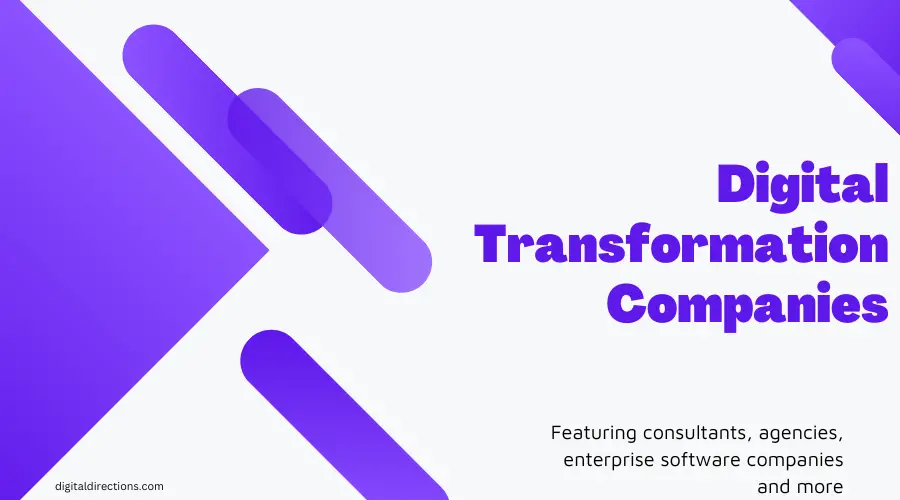Especially after COVID-19, businesses were forced to accelerate their digital transformation initiatives in order to survive. Companies had to quickly adapt and innovate in order to stay competitive, but not all of them could do it without help.
This is where outsourcing comes into the picture.
Outsourcing your digital transformation can be beneficial for companies if done correctly. It can provide the expertise, tools, and resources needed to stay ahead of the competition. Plus, it can help reduce costs while allowing you to focus more on core business activities.
But outsourcing isn’t always a good idea. It comes with its own risks and challenges.
For example, there may be language barriers or cultural differences that could lead to miscommunication or misunderstandings between teams. There are also legal issues that may arise from using an outside provider for certain tasks.
So what should you do? Ultimately, it depends on your specific situation.
Let’s take a look at the reasons for and against digital transformation outsourcing so you can decide whether it’s right for your company.
But first, what’s in the driver’s seat of digital transformation?
What is driving digital transformation?
Digital transformation is driven by technology, specifically the emergence of new digital technologies. This includes cloud computing, mobile devices and apps, analytics, artificial intelligence (AI), and machine learning (ML) – technologies that enable businesses to create more efficient and effective ways of doing things.
Companies that want to stay competitive need to embrace these technological advancements in order to improve their products and services.
Digital transformation can involve a range of activities such as modernizing core systems, designing customer experiences, or creating new business models.
We touched upon the impact of the pandemic on digital transformation, but to expand on that, this global transformation is what prompted companies to write new chapters in their digital journey. Companies are looking for ways to enable remote work, streamline customer service and communication, ensure business continuity, and more.
In light of this new era, it seems like an ideal time to outsource digital transformation. Like anything, however, there are pros and cons to consider before outsourcing a digital transformation project.
Why outsource your digital transformation?
Source: Unsplash
Using the analogy of a car, if you don’t want to become an expert mechanic and learn how to build and maintain a car from scratch, then outsourcing is the way to go.
If your business doesn’t have the technical expertise or resources necessary for digital transformation, it might be worth considering outsourcing.
By consolidating responsibility for the project in one vendor, it is also easier to keep track of progress and budgeting.
Certain scenarios might call for outsourcing, including:
You don’t have the internal resources to manage a project of this magnitude
A third-party vendor can provide specialized skills that your business may not possess in-house – such as software development or cloud computing expertise – allowing you to quickly implement new technologies to meet customer needs and stay competitive.
The project has tight deadlines and cannot be completed within the timeframe
Outsourcing can also be beneficial in situations where you need to quickly complete a project. Because the vendor already has an established team of experts, they can work faster and more efficiently than if you were to build your own internal team from scratch.
You need to scale quickly and cost-effectively
Additionally, outsourcing digital transformation can be less expensive than hiring an internal team. When you outsource, you don’t have to worry about recruiting or training new employees or dealing with the costs of benefits.
You need to access the latest technology
Outsourcing can also provide access to the most up-to-date technologies and processes. As digital transformation evolves, so do the technologies that are used.
Vendors often have access to the latest tools and resources that can help you stay ahead of your competitors in terms of innovation and customer service.
When outsourcing your digital transformation isn’t such a good idea
Before you sign a contract with an outsourcing vendor, it’s important to consider the potential drawbacks. Depending on your business needs and goals, outsourcing might not be the best option for you.
Here are some situations in which it would be better to manage the transformation internally:
You want complete control
When you outsource, you give up control of the project to the vendor. This can be risky, as you will have no control over how the project is managed or the quality of work produced. Many businesses often place control as a top priority, and outsourcing can be a problem in this regard
You need long-term support and maintenance
Outsourcing vendors typically specialize in one area – such as software development or cloud computing – and may not be able to provide ongoing maintenance and support for your system after the project is complete.
The importance of the long-term can’t be stressed enough when it comes to digital transformation. This is because digital transformation projects typically involve a lot of change and require ongoing maintenance.
You want to be able to make strategic changes often
Outsourcing can limit your flexibility. The vendor may be reluctant to make changes to the project or adjust timelines if you decide to pivot in a different direction. If you want the freedom to make strategic changes often, it’s better to manage the transformation internally.
You want a sense of security
It’s important to consider the security implications of outsourcing. When you outsource, you are handing over sensitive company data to a third-party vendor – and this can be risky.
If you’re pressed about the risks, manage in-house so you know your data is secure and protected, or, alternatively, do your due diligence and find a vendor with a strong security reputation.
What to look for in a quality IT outsourcing partner
Source: Unsplash
If your business has decided that outsourcing is the way to go, there are a few key things to look for in an IT outsourcing partner or digital transformation company.
- Experience: Look for a vendor with experience in digital transformation and customer success stories that demonstrate their ability to deliver on time and within budget. Ask questions like: How long have you been in business? What types of projects have you completed before? Do you have experience with similar projects?
- Expertise: Choose a vendor who has expertise in the technology your business needs, such as cloud computing or software development. For example, if you’re looking for a vendor to help with your mobile app development, make sure they have the right experience and technical know-how.
- Reputation: Ask for references or read reviews online to get an idea of how reliable the vendor is. This is where it’s important to do your homework, as you don’t want to end up with a vendor who can’t deliver.
- Cost: Make sure you understand the total cost of the project – including any hidden costs – before signing a contract with the vendor so you can be sure it’s worth the investment. What is the vendor’s fee structure? Is there a minimum commitment or are you billed on an hourly basis?
- Security: Ask about their security protocols and procedures to ensure your data is safe and protected. Ensure that the vendor has a secure infrastructure in place to protect your data and comply with any applicable regulations or laws.
- Flexibility: Make sure the vendor is able to adjust the project timeline if you need to pivot in a different direction or make strategic changes often. Digital transformation is an ongoing process and you want an IT outsourcing partner that can be flexible and responsive to your needs. For example, if you need additional resources or expertise, make sure the vendor has the capacity to scale up quickly.
Tips on fostering a successful partnership
While finding a quality vendor is important, it’s also important to foster a successful partnership. Don’t forget to put in the effort to create a successful outsourcing relationship with these useful tips.
- Communication: It’s important to keep the lines of communication open at all times with your IT outsourcing partner. Make sure you both have a clear understanding of the project goals and objectives. It’s also important to establish a timeline for the completion of each milestone so that both parties are aware of expectations.
- Trust: The relationship between your business and IT outsourcing partner should be based on trust. Make sure you have confidence in their abilities and they understand your needs as a customer. This will help ensure successful collaboration throughout the life cycle of the project.
- Accountability: Make sure there are clear measures of success and accountability in place. This will help both parties stay on track and reach the project goals.
FINAL WORD
Overall, digital transformation is a complex process that requires careful planning and execution.
Choosing an experienced IT outsourcing partner can be a great way to get started on the right foot—but only if they have the necessary expertise and reputation for success.
Take time to research potential vendors and consultants, and make sure you have a clear understanding of the project goals before making any commitments.
With the right partner in place, you can ensure a successful digital transformation.



